High Level Puzzles For SBI PO PDF
Download SBI PO Level Puzzles questions and Answers PDF with solutions and detailed explanations. Previous year asked and model practice questions on Puzzles for SBI PO prelims and mains exam.
Download High Level Puzzles For SBI PO PDF
790+ Mocks – Just Rs. 194 – Coupon SBIDREAM70
Take a Free SBI PO Mock Test
Download SBI PO Previous Papers PDF
Instructions
Digvijay, Gayatri, Falguni, Mahima, Tanya, Sachin, Lalit and Abhinav are lawyers who attend an interview. One interview is held on each day of the week from Monday to Saturday and two interviews are held on Sunday. The interviewer asks questions on any one of the subjects among company law, the Indian penal code, the Indian bankruptcy code, administrative law, constitutional law, jurisprudence, land laws and family law. Also, among the candidates’ two wear blazers, two wear ties, two carry files and two wear moccasins, each candidate has at least one of the above.
Additional information which has been given:
1. Digvijay who is interviewed on a Wednesday does not wear a blazer. Administrative law is asked on a Saturday.
2. The interviewer tries to schedule interviews such that the first letter of the day is the same as the candidates’ initials.
3. The ones who carry files are either asked questions on land laws or on company law and are interviewed before Thursday.
4. The ones who wear blazers are interviewed on consecutive days which is not over the weekend.
5. If Mahima is asked questions on land laws then Abhinav will be asked on family law and vice-versa. There must be at least one day in between Mahima and Gayatri’s interview.
6. Gayatri does not know about the Indian bankruptcy code so she fails the interview.
7. Sachin and Abhinav wear moccasins while Lalit’s interview is the last and he is asked about Jurisprudence.
8. The one interviewed on Wednesday wears the same attire as what one of the candidates wears on Sunday.
Question 1: Which of the following is a correct triplet?
a) Falguni-Constitutional law-Blazer
b) Digvijay-Wednesday-Tie
c) Lalit-Jurisprudence-Moccasins
d) More than one of the above
e) None of the above
Question 2: Which of the following subjects is asked on the weekend?
a) Constitutional law
b) Land Laws
c) Company Law
d) None of the above
e) More than one of the above
Question 3: What subject is asked to Mahima?
a) Land laws
b) Indian Bankruptcy code
c) Company Law
d) None of the above
e) Cannot be determined
Question 4: Which candidate is interviewed on Thursday?
a) Gayatri
b) Tanya
c) Either of the above
d) None of the above
e) Cannot be determined
Question 5: Which candidate is asked about Administrative law?
a) Abhinav
b) Digvijay
c) Sachin
d) Falguni
e) Cannot be determined
Take a Free Mock test for SBI PO
Download SBI PO Previous Papers PDF
Instructions
4 athletes- A, B, C and D participated in 3 races- R1, R2 and R3. The person to finish the race first is given 1st position and so on till position 4. No two athletes finished at the same position in a race and no athlete finished any two races with the same position. Some additional information is also known about the races:
1. D was not the last to finish R2.
2. Sum of positions for C was the maximum possible.
3. One among A and B came last in R3.
4. B finished 1st in R1 and he was not the last person to finish R3.
5. A stood 3rd in R1.
6. Absolute difference in sum of positions for C and D was 2.
7. The athlete with the least sum of positions was declared the ultimate winner.
Question 6: For how many athletes is it possible to determine their exact positions in each race?
a) 0
b) 3
c) 2
d) 4
e) None of the above
Question 7: At which position C finished in R2?
a) 2
b) 3
c) 1
d) 4
e) Cannot be determined
Question 8: What was the absolute difference in positions of B in R3 and D in R1?
a) 2
b) 0
c) 1
d) 3
e) Cannot be determined
Question 9: Who was the ultimate winner?
a) A
b) D
c) B
d) C
e) Cannot be determined
Question 10: What was the sum of positions for A?
a) 9
b) 8
c) 7
d) 6
e) None of the above
Banking 1 Year Plan – 350 Mocks for just Rs. 499
SBI PO Important Questions PDF
Instructions
Read the following information carefully and answer the given question.
Ten friends, A, B, C, D, E, F, G, H, I, and J from two different schools DPS and RPS are playing five different games viz. badminton, chess, lawn tennis, table tennis and squash. Each game is played by two friends from different schools. Four of the friends are female and others are male. It is known that:
Three out of four females are from DPS and one is from RPS. A plays lawn tennis against a male while C plays against a female from RPS. F plays badminton and D plays chess and both are from RPS. No two females play against each other. G plays squash against a female from DPS. A, E and I are from the same school. J is the only female from RPS. B is a female and she plays neither chess nor squash. I and E are of the same gender and E plays against G.
Question 11: For how many friends, can their school be uniquely determined?
a) 6
b) 8
c) 4
d) 5
e) 10
Question 12: Who of the following is not a male?
a) A
b) I
c) H
d) F
e) D
Question 13: Which game is played by I?
a) lawn tennis
b) table tennis
c) badminton
d) chess
e) squash
Question 14: Who plays table tennis?
a) I
b) E
c) J
d) H
e) B
Question 15: Who of the following is not from RPS?
a) H
b) B
c) J
d) G
e) More than one of the above
15000 Solved Questions – Free Banking Study Material
Instructions
Read the following information carefully and answer the given question.
Eight persons, A, B, C, D, E, F, G and H live is a eight-story building, where the ground floor is reserved for parking, such that each person lives on a different floor. They belong to different professions viz. Farmer, Doctor, Accountant, Scientist, Painter, Engineer, Businessman, and Mechanic, not necessarily in that order. It is known that:
B does not live just below or just above the H’s floor. The Doctor and the Engineer live on consecutive floors. A lives just above the Accountant and E lives just below the Accountant. The Farmer, who lives above the Scientist and below the Accountant, lives three floors above the Painter. D is the doctor and H is the Painter. B is not the Accountant. G lives above C but below F. E lives two floors above the Businessman.
Question 16: For how many friends, can their floor be uniquely determined?
a) 6
b) 8
c) 4
d) 5
e) 7
Question 17: How many people live below E?
a) 3
b) 2
c) 4
d) 6
e) 5
Question 18: What is the profession of F?
a) The Accountant
b) The Mechanic
c) The Farmer
d) The Engineer
e) Cannot be determined
Question 19: Who live/s between the floors on which the Farmer and the Businessman live?
a) The Painter
b) The Accountant
c) The Mechanic
d) The Scientist
e) More than one of the above
Question 20: Who lives three floors below the Doctor?
a) C
b) A
c) B
d) E
e) Cannot be determined
Daily Free GK – Current Affairs Tests
Answers & Solutions:
1) Answer (B)
From statement 1, 2, and 7 we can gather the following information:

Now, as per statement 2 Tanya will be interviewed either on Tuesday or Thursday and Sachin will be interviewed on either Saturday or Sunday.
If Tanya is interviewed on Thursday and Sachin is interviewed on Saturday then Gayatri must be interviewed on Sunday since statement 5 says at least a one day gap is required between Mahima and Gayatri’s interview. So, Abhinav will have to be interviewed on Tuesday. [Case 1]
Similarly, If Tanya is interviewed on Thursday and Sachin is interviewed on Sunday then Gayatri must be interviewed on Saturday since statement 5 says at least a one day gap is required between Mahima and Gayatri’s interview. However, Gayatri is asked questions on Indian Bankruptcy Code (IBC) (from statement 6) while the person interviewed on Saturday is asked admin law (statement 1) so this case is not possible.
If Tanya is interviewed on Tuesday and Sachin on Sunday then Gayatri will have to be interviewed on Thursday since she is asked about IBC and not admin law.
From statement 4 we know that the ones wearing blazers must be on consecutive days apart from the weekend. Also, Digivijay does not wear a blazer (statement 1) so the ones wearing a blazer can either be on Monday and Tuesday or Thursday and Friday. From statement 3 we know that the ones carrying files are interviewed before Thursday, so on any two of the days among Monday, Tuesday and Wednesday.
Even if one of the days is Wednesday, at least one person must carry a file on Monday and Tuesday. So, the ones wearing a blazer must be on Thursday and Friday.
In Case 1, upon placing the information we get the following:

However, as per statement 8, this is not possible. So, this case can be eliminated.
Similarly we can eliminate other cases. The only possible way, all the conditions are followed is:

So, Option B is correct.
2) Answer (D)
From statement 1, 2, and 7 we can gather the following information:

Now, as per statement 2 Tanya will be interviewed either on Tuesday or Thursday and Sachin will be interviewed on either Saturday or Sunday.
If Tanya is interviewed on Thursday and Sachin is interviewed on Saturday then Gayatri must be interviewed on Sunday since statement 5 says at least a one day gap is required between Mahima and Gayatri’s interview. So, Abhinav will have to be interviewed on Tuesday. [Case 1]
Similarly, If Tanya is interviewed on Thursday and Sachin is interviewed on Sunday then Gayatri must be interviewed on Saturday since statement 5 says at least a one day gap is required between Mahima and Gayatri’s interview. However, Gayatri is asked questions on Indian Bankruptcy Code (IBC) (from statement 6) while the person interviewed on Saturday is asked admin law (statement 1) so this case is not possible.
If Tanya is interviewed on Tuesday and Sachin on Sunday then Gayatri will have to be interviewed on Thursday since she is asked about IBC and not admin law.
From statement 4 we know that the ones wearing blazers must be on consecutive days apart from the weekend. Also, Digivijay does not wear a blazer (statement 1) so the ones wearing a blazer can either be on Monday and Tuesday or Thursday and Friday. From statement 3 we know that the ones carrying files are interviewed before Thursday, so on any two of the days among Monday, Tuesday and Wednesday.
Even if one of the days is Wednesday, at least one person must carry a file on Monday and Tuesday. So, the ones wearing a blazer must be on Thursday and Friday.
In Case 1, upon placing the information we get the following:

However, as per statement 8, this is not possible. So, this case can be eliminated.
Similarly we can eliminate other cases. The only possible way, all the conditions are followed is:

Option D is correct.
3) Answer (A)
From statement 1, 2, and 7 we can gather the following information:

Now, as per statement 2 Tanya will be interviewed either on Tuesday or Thursday and Sachin will be interviewed on either Saturday or Sunday.
If Tanya is interviewed on Thursday and Sachin is interviewed on Saturday then Gayatri must be interviewed on Sunday since statement 5 says at least a one day gap is required between Mahima and Gayatri’s interview. So, Abhinav will have to be interviewed on Tuesday. [Case 1]
Similarly, If Tanya is interviewed on Thursday and Sachin is interviewed on Sunday then Gayatri must be interviewed on Saturday since statement 5 says at least a one day gap is required between Mahima and Gayatri’s interview. However, Gayatri is asked questions on Indian Bankruptcy Code (IBC) (from statement 6) while the person interviewed on Saturday is asked admin law (statement 1) so this case is not possible.
If Tanya is interviewed on Tuesday and Sachin on Sunday then Gayatri will have to be interviewed on Thursday since she is asked about IBC and not admin law.
From statement 4 we know that the ones wearing blazers must be on consecutive days apart from the weekend. Also, Digivijay does not wear a blazer (statement 1) so the ones wearing a blazer can either be on Monday and Tuesday or Thursday and Friday. From statement 3 we know that the ones carrying files are interviewed before Thursday, so on any two of the days among Monday, Tuesday and Wednesday.
Even if one of the days is Wednesday, at least one person must carry a file on Monday and Tuesday. So, the ones wearing a blazer must be on Thursday and Friday.
In Case 1, upon placing the information we get the following:

However, as per statement 8, this is not possible. So, this case can be eliminated.
Similarly we can eliminate other cases. The only possible way, all the conditions are followed is:

4) Answer (A)
From statement 1, 2, and 7 we can gather the following information:

Now, as per statement 2 Tanya will be interviewed either on Tuesday or Thursday and Sachin will be interviewed on either Saturday or Sunday.
If Tanya is interviewed on Thursday and Sachin is interviewed on Saturday then Gayatri must be interviewed on Sunday since statement 5 says at least a one day gap is required between Mahima and Gayatri’s interview. So, Abhinav will have to be interviewed on Tuesday. [Case 1]
Similarly, If Tanya is interviewed on Thursday and Sachin is interviewed on Sunday then Gayatri must be interviewed on Saturday since statement 5 says at least a one day gap is required between Mahima and Gayatri’s interview. However, Gayatri is asked questions on Indian Bankruptcy Code (IBC) (from statement 6) while the person interviewed on Saturday is asked admin law (statement 1) so this case is not possible.
If Tanya is interviewed on Tuesday and Sachin on Sunday then Gayatri will have to be interviewed on Thursday since she is asked about IBC and not admin law.
From statement 4 we know that the ones wearing blazers must be on consecutive days apart from the weekend. Also, Digivijay does not wear a blazer (statement 1) so the ones wearing a blazer can either be on Monday and Tuesday or Thursday and Friday. From statement 3 we know that the ones carrying files are interviewed before Thursday, so on any two of the days among Monday, Tuesday and Wednesday.
Even if one of the days is Wednesday, at least one person must carry a file on Monday and Tuesday. So, the ones wearing a blazer must be on Thursday and Friday.
In Case 1, upon placing the information we get the following:

However, as per statement 8, this is not possible. So, this case can be eliminated.
Similarly we can eliminate other cases. The only possible way, all the conditions are followed is:

So Option A is correct.
5) Answer (C)
From statement 1, 2, and 7 we can gather the following information:

Now, as per statement 2 Tanya will be interviewed either on Tuesday or Thursday and Sachin will be interviewed on either Saturday or Sunday.
If Tanya is interviewed on Thursday and Sachin is interviewed on Saturday then Gayatri must be interviewed on Sunday since statement 5 says at least a one day gap is required between Mahima and Gayatri’s interview. So, Abhinav will have to be interviewed on Tuesday. [Case 1]
Similarly, If Tanya is interviewed on Thursday and Sachin is interviewed on Sunday then Gayatri must be interviewed on Saturday since statement 5 says at least a one day gap is required between Mahima and Gayatri’s interview. However, Gayatri is asked questions on Indian Bankruptcy Code (IBC) (from statement 6) while the person interviewed on Saturday is asked admin law (statement 1) so this case is not possible.
If Tanya is interviewed on Tuesday and Sachin on Sunday then Gayatri will have to be interviewed on Thursday since she is asked about IBC and not admin law.
From statement 4 we know that the ones wearing blazers must be on consecutive days apart from the weekend. Also, Digivijay does not wear a blazer (statement 1) so the ones wearing a blazer can either be on Monday and Tuesday or Thursday and Friday. From statement 3 we know that the ones carrying files are interviewed before Thursday, so on any two of the days among Monday, Tuesday and Wednesday.
Even if one of the days is Wednesday, at least one person must carry a file on Monday and Tuesday. So, the ones wearing a blazer must be on Thursday and Friday.
In Case 1, upon placing the information we get the following:

However, as per statement 8, this is not possible. So, this case can be eliminated.
Similarly we can eliminate other cases. The only possible way, all the conditions are followed is:

So Option C is correct.
6) Answer (D)
Since, each athlete finished a race with a different position and each athlete finished in a different position in each race. So, we have the possible unordered triplets of positions that anyone of them could have:
(1,2,3), (1,2,4), (1,3,4) and (2,3,4).
From 2, C’s sum of positions is maximum i.e 9. So, C must have got (2,3,4) positions in any order.
From 6, D’s positions are (1,2,4).
From 1, 4, and 5 the table can be filled as below:

From 3, it can be concluded that A had (1,3,4) as last position in R3 for B is not possible. The table further looks like

Now the entire table can be filled as:

From 7 we can conclude that B was the ultimate winner.
Since, we can determine the exact position of the athletes in each race. Hence, option D.
7) Answer (D)
Since, each athlete finished a race with a different position and each athlete finished in a different position in each race. So, we have the possible unordered triplets of positions that anyone of them could have:
(1,2,3), (1,2,4), (1,3,4) and (2,3,4).
From 2, C’s sum of positions is maximum i.e 9. So, C must have got (2,3,4) positions in any order.
From 6, D’s positions are (1,2,4).
From 1, 4, and 5 the table can be filled as below:

From 3, it can be concluded that A had (1,3,4) as last position in R3 for B is not possible. The table further looks like

Now the entire table can be filled as:

From 7 we can conclude that B was the ultimate winner.
C finished at 4th position in R2. Hence, option D.
8) Answer (A)
Since, each athlete finished a race with a different position and each athlete finished in a different position in each race. So, we have the possible unordered triplets of positions that anyone of them could have:
(1,2,3), (1,2,4), (1,3,4) and (2,3,4).
From 2, C’s sum of positions is maximum i.e 9. So, C must have got (2,3,4) positions in any order.
From 6, D’s positions are (1,2,4).
From 1, 4, and 5 the table can be filled as below:

From 3, it can be concluded that A had (1,3,4) as last position in R3 for B is not possible. The table further looks like

Now the entire table can be filled as:

From 7 we can conclude that B was the ultimate winner.
Absolute difference = |2-4|= 2.
Hence, option A.
9) Answer (C)
Since, each athlete finished a race with a different position and each athlete finished in a different position in each race. So, we have the possible unordered triplets of positions that anyone of them could have:
(1,2,3), (1,2,4), (1,3,4) and (2,3,4).
From 2, C’s sum of positions is maximum i.e 9. So, C must have got (2,3,4) positions in any order.
From 6, D’s positions are (1,2,4).
From 1, 4, and 5 the table can be filled as below:

From 3, it can be concluded that A had (1,3,4) as last position in R3 for B is not possible. The table further looks like

Now the entire table can be filled as:

From 7 we can conclude that B was the ultimate winner. Hence, option C.
10) Answer (B)
Since, each athlete finished a race with a different position and each athlete finished in a different position in each race. So, we have the possible unordered triplets of positions that anyone of them could have:
(1,2,3), (1,2,4), (1,3,4) and (2,3,4).
From 2, C’s sum of positions is maximum i.e 9. So, C must have got (2,3,4) positions in any order.
From 6, D’s positions are (1,2,4).
From 1, 4, and 5 the table can be filled as below:

From 3, it can be concluded that A had (1,3,4) as last position in R3 for B is not possible. The table further looks like

Now the entire table can be filled as:

From 7 we can conclude that B was the ultimate winner.
From the table it is clear that sum of positions for A is 8. Hence, option B.
11) Answer (E)
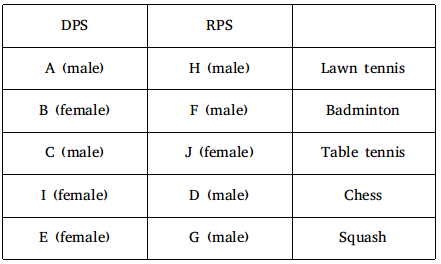
From the table, we can see that we can determine the school of all the ten friends.
Hence, option E is the correct answer.
12) Answer (B)
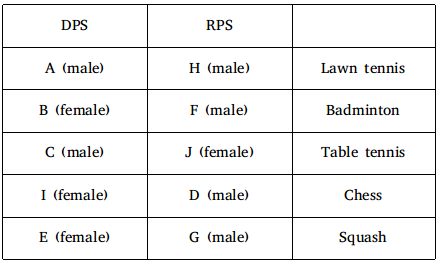
From the table, we can see that I is a female.
Hence, option B is the correct answer.
13) Answer (D)
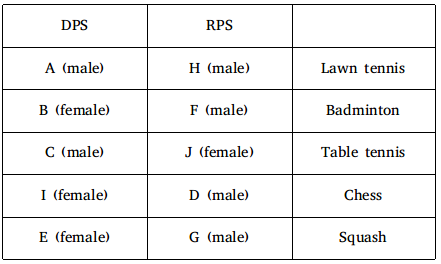
From the table, we can see that I plays chess.
Hence, option D is the correct answer.
14) Answer (C)
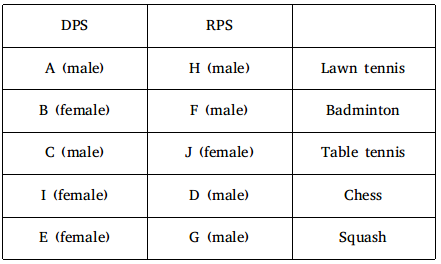
From the table, we can see that J plays table tennis.
Hence, option C is the correct answer.
15) Answer (B)
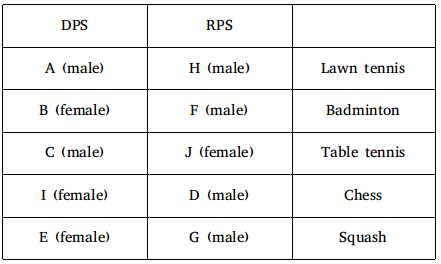
From the table, we can see that B is not from RPS.
Hence, option B is the correct answer.
16) Answer (B)
E lives two floors above the Businessman. A lives just above the Accountant and E lives just below the Accountant. Thus, we get the following arrangement:
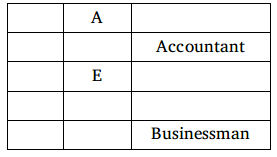
The Farmer, who lives above the Scientist and below the Accountant, lives three floors above the Painter. In the above arrangement, we have denoted five floors and only three floors are left. The Farmer lives three floors above the Painter. So, there are two persons between the Farmer and the Painter. Also, the Scientist lives below the Farmer.
If we have three floors below the floor of Businessman, two of the floors will be occupied by the Painter and the Scientist and one floor will be left. Also, between the Accountant and the Businessman, one floor will be occupied by the Farmer and one floor will be empty. We know that the Doctor and the Engineer live on consecutive floors. In this case, we will not have two empty consecutive floors. So, we cannot have three floors below the Businessman.
If we have two floors below the Businessman, both will be occupied by the Painter and the Scientist. One floor must be above A’s floor. We get the following arrangement:
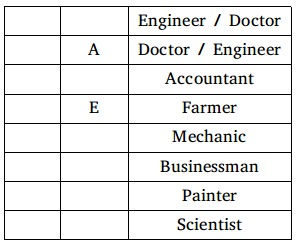
D is the doctor and H is the Painter. B is not the Accountant. B does not live just below or just above the H’s floor. Thus, B must be the Mechanic. G lives above C but below F. Therefore, G must be the Businessman, F must be the accountant and C must be the Scientist. We get the final arrangement as:
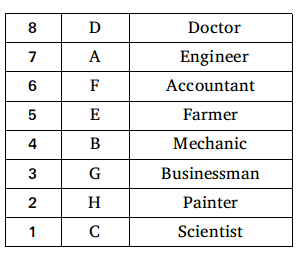
From the arrangement, we can see that for all the eight persons, we can find the floors on which they live.
Hence, option B is the correct answer.
17) Answer (C)
E lives two floors above the Businessman. A lives just above the Accountant and E lives just below the Accountant. Thus, we get the following arrangement:

The Farmer, who lives above the Scientist and below the Accountant, lives three floors above the Painter. In the above arrangement, we have denoted five floors and only three floors are left. The Farmer lives three floors above the Painter. So, there are two persons between the Farmer and the Painter. Also, the Scientist lives below the Farmer.
If we have three floors below the floor of Businessman, two of the floors will be occupied by the Painter and the Scientist and one floor will be left. Also, between the Accountant and the Businessman, one floor will be occupied by the Farmer and one floor will be empty. We know that the Doctor and the Engineer live on consecutive floors. In this case, we will not have two empty consecutive floors. So, we cannot have three floors below the Businessman.
If we have two floors below the Businessman, both will be occupied by the Painter and the Scientist. One floor must be above A’s floor. We get the following arrangement:

D is the doctor and H is the Painter. B is not the Accountant. B does not live just below or just above the H’s floor. Thus, B must be the Mechanic. G lives above C but below F. Therefore, G must be the Businessman, F must be the accountant and C must be the Scientist. We get the final arrangement as:

From the arrangement, we can see that four people live below E.
Hence, option C is the correct answer.
18) Answer (A)
E lives two floors above the Businessman. A lives just above the Accountant and E lives just below the Accountant. Thus, we get the following arrangement:

The Farmer, who lives above the Scientist and below the Accountant, lives three floors above the Painter. In the above arrangement, we have denoted five floors and only three floors are left. The Farmer lives three floors above the Painter. So, there are two persons between the Farmer and the Painter. Also, the Scientist lives below the Farmer.
If we have three floors below the floor of Businessman, two of the floors will be occupied by the Painter and the Scientist and one floor will be left. Also, between the Accountant and the Businessman, one floor will be occupied by the Farmer and one floor will be empty. We know that the Doctor and the Engineer live on consecutive floors. In this case, we will not have two empty consecutive floors. So, we cannot have three floors below the Businessman.
If we have two floors below the Businessman, both will be occupied by the Painter and the Scientist. One floor must be above A’s floor. We get the following arrangement:

D is the doctor and H is the Painter. B is not the Accountant. B does not live just below or just above the H’s floor. Thus, B must be the Mechanic. G lives above C but below F. Therefore, G must be the Businessman, F must be the accountant and C must be the Scientist. We get the final arrangement as:

From the arrangement, we can see that F is the Accountant.
Hence, option A is the correct answer.
19) Answer (C)
E lives two floors above the Businessman. A lives just above the Accountant and E lives just below the Accountant. Thus, we get the following arrangement:

The Farmer, who lives above the Scientist and below the Accountant, lives three floors above the Painter. In the above arrangement, we have denoted five floors and only three floors are left. The Farmer lives three floors above the Painter. So, there are two persons between the Farmer and the Painter. Also, the Scientist lives below the Farmer.
If we have three floors below the floor of Businessman, two of the floors will be occupied by the Painter and the Scientist and one floor will be left. Also, between the Accountant and the Businessman, one floor will be occupied by the Farmer and one floor will be empty. We know that the Doctor and the Engineer live on consecutive floors. In this case, we will not have two empty consecutive floors. So, we cannot have three floors below the Businessman.
If we have two floors below the Businessman, both will be occupied by the Painter and the Scientist. One floor must be above A’s floor. We get the following arrangement:

D is the doctor and H is the Painter. B is not the Accountant. B does not live just below or just above the H’s floor. Thus, B must be the Mechanic. G lives above C but below F. Therefore, G must be the Businessman, F must be the accountant and C must be the Scientist. We get the final arrangement as:

From the arrangement, we can see that the Mechanic lives between the Businessman and the Farmer.
Hence, option C is the correct answer.
20) Answer (D)
E lives two floors above the Businessman. A lives just above the Accountant and E lives just below the Accountant. Thus, we get the following arrangement:

The Farmer, who lives above the Scientist and below the Accountant, lives three floors above the Painter. In the above arrangement, we have denoted five floors and only three floors are left. The Farmer lives three floors above the Painter. So, there are two persons between the Farmer and the Painter. Also, the Scientist lives below the Farmer.
If we have three floors below the floor of Businessman, two of the floors will be occupied by the Painter and the Scientist and one floor will be left. Also, between the Accountant and the Businessman, one floor will be occupied by the Farmer and one floor will be empty. We know that the Doctor and the Engineer live on consecutive floors. In this case, we will not have two empty consecutive floors. So, we cannot have three floors below the Businessman.
If we have two floors below the Businessman, both will be occupied by the Painter and the Scientist. One floor must be above A’s floor. We get the following arrangement:

D is the doctor and H is the Painter. B is not the Accountant. B does not live just below or just above the H’s floor. Thus, B must be the Mechanic. G lives above C but below F. Therefore, G must be the Businessman, F must be the accountant and C must be the Scientist. We get the final arrangement as:

From the arrangement, we can see that E lives three floors below the Doctor.
Hence, option D is the correct answer.




![SBI PO Cloze Test Questions PDF [Most Important]](https://cracku.in/blog/wp-content/uploads/2022/10/Cloze-Test-Questions--218x150.png)
